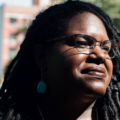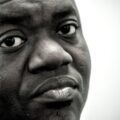Someday You’ll Love Roger Reeves

King Me
Roger Reeves
$15.00, Paperback
2014, Copper Canyon Press
Shortly after the New Year, the Poetry Society of America shared the responses of Black poets to the question, “What’s African American about African American Poetry?” in its ongoing “Yet Do I Marvel” feature. Among those who responded are Jericho Brown, LaTasha N. Nevada Diggs, and Harmony Holiday, all of who have richly honest things to say.
In his response, Roger Reeves addresses the premise of the question, noting that it “still traffics in several fictions—the fiction of stable identity, the fiction of essential blackness, the fiction that aesthetics and aesthetic choices follow the biopolitical, the sociological […] Rather than spend five hundred words deconstructing the fictitious nature of identity, I would like to answer what I believe to be the spirit of the question: how are poets of African descent shaping, changing, conversing with, engaging, trafficking, and subverting the Tradition (American, African-American, Surrealist, the list could go on), canon and canon formation.” He observes that some Black poets “make the past visible, show mastery of form, but like Basquiat, they somehow break it, deform it, and disappear it,” and others “break from traditional notions of the lyric and often in highly conceptual fashion.” Black poets are constantly engaging “aesthetic, political, and cultural work on the page.”
Reeves draws the readers’ attention to writers such as Terrance Hayes, Natasha Trethewey, Kevin Young, Douglass Kearney, and Dawn Lundy Martin, among others, and reminds us of the staggering influence Black poets such as Amiri Baraka, Lucille Clifton, Ai, Evie Shockley, Yusef Komunyakaa, Harryette Mullen, Carl Phillips, Tyehimba Jess, Cornelius Eady, Toi Derricotte, Nikki Giovanni, Claudia Rankine, Rita Dove, Tracy K. Smith, and so many more, have had on American poetry.
In an interview with Nidya Sarria of the Miami New Times in October of 2011, Reeves discusses his approach to craft, resounding the major points of his response to the Poetry Society:
Poetry as a practice also allows me to render traumatic and not-so traumatic events in a way that puts me back in control of the event […] Often, poetry is a private conversation that is had between oneself and one’s other self, which means that poetry is always public and yet personal […] I am interested in corralling sound into patterns that hopefully bring delight, but I am also interested in troubling my reader–nothing easy, nothing without a little blood and bleeding.
Delightful to the ear, and never easy, Reeves’s poetry weaves between everyday speech and, in the words of Dean Young—a noted influence of Reeves’s—“the poet’s strange contraption / of syntax and song.” Reeves bends lines, sentences, and stanzas into sculptures of highly textured language, wherein the mind and pathos of the lyric voice is complex and challenging. Take, for example, the straightforward opening of the poem “Pledge”:
I, Roger Reeves, hereby pledge that I will not come back
[…]
to this city, if this city will not come back to me.I leave the children’s thirst on the metro
next to a pink pen that no longer holds ink.I leave the numbers by which I know this city,
its epistemologies and apartheids, its mornings,
its slips of paper, its slivers and its seeds,its dry floors and short showers, its roosters
that cannot distinguish between the blue of morningand the blue of night. I leave the coffee spilled
onto the floor of the bus, your hand between my legs—
I leave, I leave—this will surely leave a stain.
There is some beauty in the worlds of Reeves’s poems—certainly beauty of language, mind, and form—but “nothing without a little blood and bleeding.” The poems in his collection travel, leading readers across the landscapes of America and the world. In “Cross Country,” the lyric voice hums:
Nigger in the twilight that is no longer a twilight
but a black creek fumbling along the spine of a boy
who is running through a city that is running out of water.
Even the lions have left for the mountains.
This is America speaking in translation, in glitter,
in gold grills and fried chicken. Auto-tune this if you must.
Cher will be singing in the brush of static from the attic
radio, believing in love after love or life after love
despite the impure thoughts of evening, despite
the rain soaking the red head of a red bird
now dead in a puddle that refuses to reflect the moon.
Reeves depicts the country’s confused darkness, its ignorance disguised as faux knowledge, perhaps, its problematic simplification of its people (reminiscent of the question, “What’s African-American about African-American Poetry?”). This is a country running from itself, manipulating voices into what it wants to hear, placing its faith in a half-hope and trying its best to ignore the ugly and gruesome parts of life. Nature is not always glamorous or glitzy: the exodus of lions for their survival, dead birds on the sidewalk, a puddle choosing to not reflect moonlight proves this darkness. Why might we as individuals or a society expect any more luster and bliss? As Reeves travels on, in “Southern Charm,” he wonders,
What’s in your speakerboxxx? The love below.
The gospel of Young Money Millionaires. Maybe,
Faulkner or Chaucer. A Parliament of Fowls
squabbling over the late-afternoon sun
that fills each blackbird’s fat throat.
I refuse to explain the head and source
of the South’s distemper? Oh Hamlet,
North Carolina, and the fallow winds
Loosening the topsoil of my lover’s body.
Oh son of the mute sharecropper. Oh bent
guitar and shattered body at the foot of a mockingbird,
what nation, what native land does nature salute?
With each poem, Reeves pulls together the past and the fresh present’s barrage of culture, asking readers to consider their cultural, political, and historical milieu. He places Young Money Millionaires in a line with Faulkner and Chaucer. He sits nature next to auto-tune. He speaks with everything near him and begs for answers to honest, hard questions. “What native land does nature salute?” It’s up to the reader to wonder too. Reeves fashions many self-portraits throughout King Me, showing readers the essential nature of empathy. In one, Reeves speaks as Guillaume-Benjamin-Amand Duchenne de Boulogne, nineteenth century master of neurology:
When treating madness, place a blindfold
over the moon rising above the nation.
If the asylum refuses you admittance, go
to the state house and call yourself the elect.
Carry nothing that cannot fail in winter. Often,
I carry the stars of madness home with a pinch
of honey. Bees are the only fruit of my kingdom.
In another, the poet becomes jazz trumpeter and vocalist Ernestine “Tiny” Davis, commanding the lyric voices of his own mind and craft, and orchestrating a community of voices, calling out questions, reaching for answers, and making human demands:
Call me tiny, anything small: an acorn
lodged in the throat of a thrush. Choke. A claw
squeezed from the purple head of a flower. Prick.
A hunk of pork butt plucked from the gums
and placed back onto the tongue. Gag. Then swallow.
Feed me. Call my appetite a kind kingdom.
Call me Queen. King me.
Just as his response to the Poetry Society of America’s question offers rigorous thought, feeling, and form, each poem in King Me challenges readers with similar rigor. Perhaps we should see madness in our society, in our kingdom, in ourselves. Language should madden us at times, as should the way we treat one another.
With the difficulty and blood of these poems comes the challenge of what we readers must do in our own lives. We must listen to the testament of Ernestine Davis, or Roger Reeves, or the student in our class, or the guy on the corner, or the politician in an other-colored state, or the survivor of genocide. We must swallow and make sense for ourselves. On a train from Rio de Janeiro, Reeves writes:
I come with the dead tucked in-
to my duffle, my genocides
folded into my wallet and you
come with yours and we shout
across the chasm of this train car
comparing whose dead sing louder
or more often or now.
Is this Africa: a slit trench
and a split lip, a photograph
of a police chief smoking a cigar
as the ear of a dead child catches his ash.
Why isn’t my hand
dropping these slices of orange
onto your tongue, Diaspora?
Why have I come to Brazil, Brother?
To infiltrate the black movement.
His lyric voices search for his place in the world and for the places of others. With a nod to some of his most important influences, Wallace Stevens and Terrance Hayes, Reeves renovates a discovery about silence and sound, language and its absence:
Like the women circling the green muscles of a horse
that stands atop a casket in the municipal parterre,
unable to locate their dead, I, too, having lost
faith in silence have placed my faith in silence.
In his poem, “An Ordinary Evening in New Haven,” Stevens discovers the divinity of description and language: “The description that makes it divinity, still speech / As it touches the point of reverberation—not grim / Reality but reality grimly seen // And spoken in paradisal parlance new.” And in “Snow for Wallace Stevens,” Terrence Hayes likewise reorients his confrontation with this discovery: “I too, having lost faith / in language, have placed my faith in language.” Reeves comes to a similar discovery: “I, too, having lost / faith in silence have placed my faith in silence.”
For Reeves, the innovation and divinity of language is as essential as genuinely listening to it and understanding its implications. He is willing to lose language in order to truly gain it. He asks readers to be silent in order to find their own language through the voices in these poems. He closes his debut collection with the hopeful title, “Someday I’ll Love Roger Reeves,”
to press nevertheless. For this is our obligation.
Let us forget our obligations. For this is love.
Let us forget our love. Our eyelids’ need for beginningsand ends and blood. Our coils of hunger
that turn another into dried honey on our hands.And what if this goes on forever—our ours?
Our drafts and fragments? Our blizzards and our cancers?
Then let us. Then, let us hold each other toward heavenand forget that we were once made of flesh,
that this is the fall our gods refuse to clean with fire or water.
We are not born loving ourselves. It is difficult, and we must want and learn to do so. On our way to loving ourselves, there will be self-discoveries and realities of the world that will be difficult to swallow. But we must swallow them in order to one day love ourselves. Reeves battles the questions and gruesomeness of the world with a syntax and texture all his own. He considers the universal in the personal, the idea in the sound, and the person in natural and unnatural contexts, asking, “How can I be the most decent human being possible? How can we become a more decent world?” Roger Reeves challenges readers to become better versions of themselves, better for themselves and for others.
About Wesley Rothman
Wesley Rothman serves as an assistant poetry editor for Narrative and reads for Ploughshares. He helps curate the Breakwater Reading Series, is Emerson College liaison to the Massachusetts Poetry Festival, and tutors writing at Snowden International School. Rothman holds a BA from the University of San Diego and is completing his MFA at Emerson where he teaches writing.





